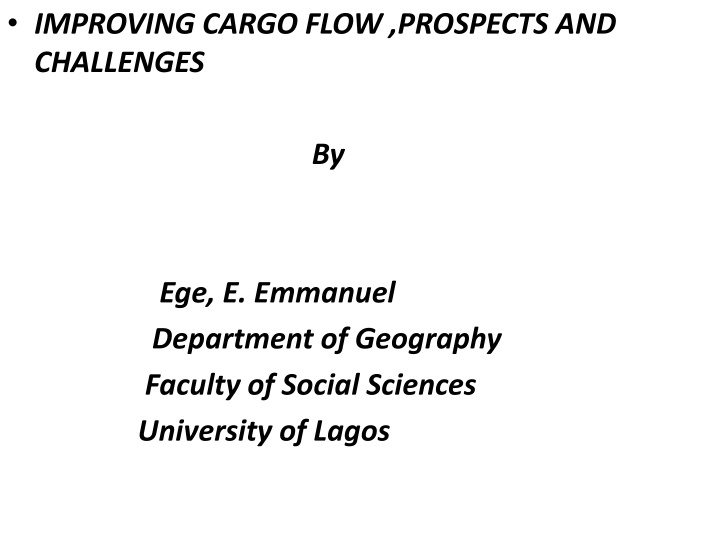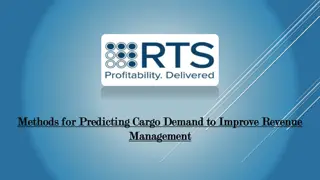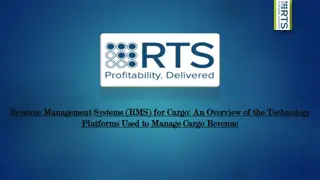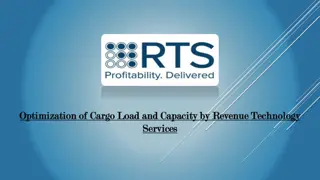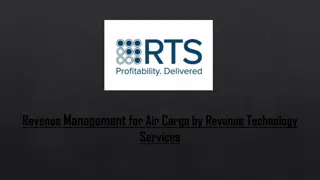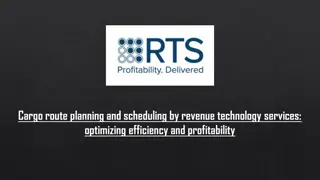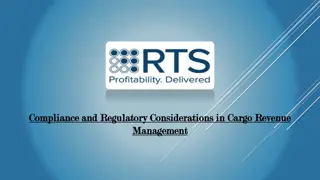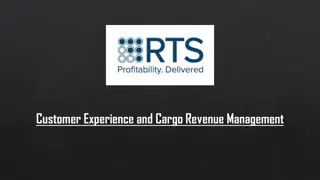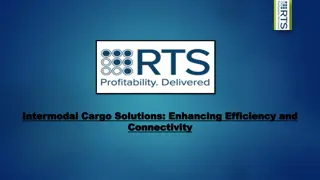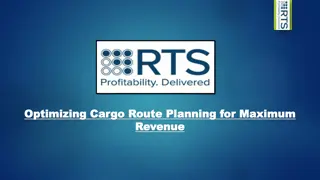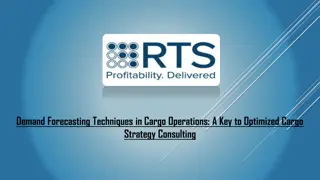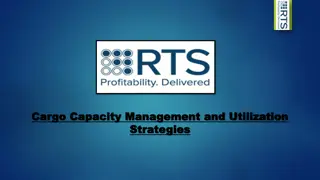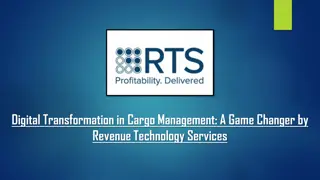Enhancing Cargo Flow in Nigeria: Challenges and Solutions
Nigeria's transport sector is undergoing a significant transformation to improve cargo flow efficiency, including the establishment of Inland Container Depots (ICDs). These efforts aim to enhance infrastructure, boost the economy, create jobs, and alleviate poverty by facilitating the movement of goods to inland destinations. Learn about the prospects and challenges faced in this endeavor.
Download Presentation

Please find below an Image/Link to download the presentation.
The content on the website is provided AS IS for your information and personal use only. It may not be sold, licensed, or shared on other websites without obtaining consent from the author.If you encounter any issues during the download, it is possible that the publisher has removed the file from their server.
You are allowed to download the files provided on this website for personal or commercial use, subject to the condition that they are used lawfully. All files are the property of their respective owners.
The content on the website is provided AS IS for your information and personal use only. It may not be sold, licensed, or shared on other websites without obtaining consent from the author.
E N D
Presentation Transcript
IMPROVING CARGO FLOW ,PROSPECTS AND CHALLENGES By Ege, E. Emmanuel Department of Geography Faculty of Social Sciences University of Lagos
INTRODUCTION Definition of Cargo All articles, goods, materials, merchandise, or wares carried onboard an aircraft, ship, train, or truck, and for which an air waybill, or bill of lading, or other receipt is issued by the carrier. It includes livestock, but usually does not include bunkers (fuel for powering the vessel or vehicle), accompanying baggage, vessel or vehicle's equipment and spare parts, mail, and stores. Personnel carried onboard are classified as crew or passengers.
Cargo or freight are goods or produce being conveyed generally for commercial gain by ship, boat, or aircraft, although the term is now often extended to cover all types of freight, including that carried by train, van, truck, or intermodal container. The term cargo is also used in case of goods in the cold-chain, because the perishable inventory is always in transit towards a final end-use, even when it is held in cold storage or other similar climate- controlled facility.
From rails and roads to ports and airports, Nigeria s transport sector is facing an extensive overhaul. The country has long suffered as a result of inadequate investment in infrastructure, constraining the movement of people and goods One of this strategies is the establishment of Inland Container Depots (ICDs) or dry ports which are inland intermodal terminals directly connected by road or rail to a sea port.
They are meant to operate as centres for the trans- shipment of sea cargo to inland destinations. The idea behind this novel policy thrust is to attain the fundamental objectives of the government which are geared towards growing the economy, creating employment opportunities and reducing poverty.
INLAND CONTAINER DEPOTS IN NIGERIA ICD operations in Nigeria started in 1979 when Elder Dempster lines, a leading member of the United Kingdom West Africa Liner Conference (UKWAL), joined with the Nigeria Insurance Corporation of Nigeria (NICON) to establish ICDs in Kano and Kaduna under the management of a company called Inland Container Nigeria Limited (ICNL).
The two ICDs were originally conceived to serve the hinterland and its landlocked neighbours (Niger and Chad), and were established as extensions to the seaports and to operate within guidelines set by the Nigerian Ports Authority, whereby cargo discharged at the seaports destined for the hinterland is immediately land freighted to the ICDs under Customs bond.
The ICD Implementation Committee was established, with the Nigerian Shippers Council as the implementing agency. Concessions were granted to six firms to build, own and transfer ICDs at six locations, namely Kano, Kaduna, Funtua (Katsina State), Isiala Ngwa (Abia State), Jos (Plateau State) and Ibadan (Oyo State). The facilities were expected to be linked to the seaports by rail.
However, more than 10 years after the so-called concession, none of the ICDs has become operational with the various actors including the Federal Government, State Governments, Nigerian Shippers Council, Nigeria Railway Corporation and the concessionaires trading blames and engaging in buck-passing
It is unfortunate that while Nigeria commenced the dry ports initiative as a signatory to the United Nations Conference on Trade and Development (UNCTAD) before any other country in Africa, the current index point to the fact that Ghana has overtaken her
If the ICDs must work, those who have been licensed to operate them must immediately wake up to the responsibility of making necessary investment in the facilities.
Analysis of ICD Ownership structure old proposed Governing board/ approving authority Private ICNL/ NICON Private BOOT model operators Nigerian Ports Authority Implementation Committee ICD/NSC Date of commencement 1979-1996 (closed) 2009 staged opening Rail /railhead from port to ICD Public NRC Nigerian Railway Corp. (Public) Road from port to ICD Fed. Government Fed. Government and State GVT nland waterways transport to ICDs Inland water (No) Inland water (No) Multimodal transport links from port to ICD Few alternative routes Limited alternative routes
Ownership structure Old Proposed Regional transport development plans/ transport policies No connection to African Union (AU) or Transport Policies Fits Nigeria s Transport Master Plan (MITI), New Partnership for Africa s Development (NEPAD) and AU charter Guidelines for ICD operations Nigerian Ports Authority Implementation Committee ICD/Nigerian Shippers Council Labour (ICD) LOW- skilled Low/Medium skilled Cargo flows/ direction from port to ICD Northern regions (Kano and Kaduna) Whole of Nigeria plus landlocked neighbours Services network from port-ICD to final destination Rail/ICNL truck NARTO/private Seaport delays due Very high Privatization should
Owner ship structure Old Proposed Services network from port-ICD to final destination Rail/ICNL truck NARTO/private Very High Seaport delays due to logistics weaknesses Privatization should reduce delays Very High Traffic congestion (seaport) High privatization may reduce congestion
SWOT Analysis for Nigerian ICDs Strengths Weakness Substantial revenues from hinterland shippers participation Level of Government involvement/interference in ports Large volumes of cargo to hinterlands Inadequate infrastructural development e.g. railways Control cargoes destined for neighbouring countries, notably Chad, Sudan and Niger Excessive pressure on road transport Slow implementation of the new ICD project Industrial development encouragement Lack of an integrated transport system Locking Nigeria into international trade flows Lack of trained/experienced personnel on ICD operations Shortage of computerized cargo tracking systems e.g. RFID
Opportunities Challenges ncreased revenue to Government from expanded trade Commercialization putting pressure on freight charges Multimodal transport connections and positive trade-offs Increase in freight rate charges Increased security measures to counter terrorist threats and arms smuggling Consultation on freight rates Diversified trade Excessive imports leading to cargo imbalance Maritime developments, e.g. expanded shipping activities High cost of inland transport Connections to landlocked countries, facilitating trade Loss of maritime land due to privatization sales Connection to African Union transport policies Port activities and environmental hazards Attraction of foreign investors
Inland water transport offers the most economical, energy efficient and environmental friendly means of transporting all types of cargo from place to place. It also offers safer and cheaper rates in areas where water exists naturally. This facilitates commerce, promotes wealth creation, poverty alleviation, and creates job opportunities for youths within such regions..
Despite the immense benefits to the economy, inland water transport in Nigeria has had a long history of neglect by both the government and the private sector. Little efforts were made to develop inland water transport facilities prior to the 1980s. This stems largely from policy inconsistency, limited private sector involvement, and conflicts by agencies involved in the management of inland water transport in Nigeria.
Nigeria aspires to be amongst the top 20 largest economics by the year 2020 and successful operations and management of the inland waterways This can only be achieved by actual implementation of the enacted cabotage laws The effective implementation of the Cabotage Act will catalyse the growth and development of the transportation sector and reduce the over dependence of the nation on road transportation operations and its consequent damage of the roads
PROBLEMS OF THE ROAD TRANSPORTATION BAD ROAD: A major challenge facing road cargo movement is the condition of the roads which are in bad shape across the country. This causes unnecessary route diversions by drivers to avoid damages on goods and vehicles. The vehicles also get stuck in heavy traffics which take hours or days to clear thereby delaying on-time product delivery and customer satisfaction. It also increases freight charges as more resources will be expended and turnaround time of the trucks will be increased.
ROBBERY ATTACK: This is also a major challenge facing road cargo. The roads are not safe to move cargo interstate. Cargos are prone to robbery attack as the roads are not safe
SOLUTION Provision of good roads Provision and adequate use of other forms of cargo transportation to enhance seamless and swift delivery of cargoes. Provision of credit facilities Provision of adequate security to cargo and road users Establishment of regulatory bodies to formulate policies and make sure road transportation is organized and well managed like other forms of cargo transportation.
Safety issues , strapping of containers Drivers consumption of bad substances Vehicles road worthiness
CONCLUSION Cumbersome customs clearance procedures Multiplicity of security agencies at seaports Additional cargo handling costs High inland transport costs Persistent congestion at the seaports
